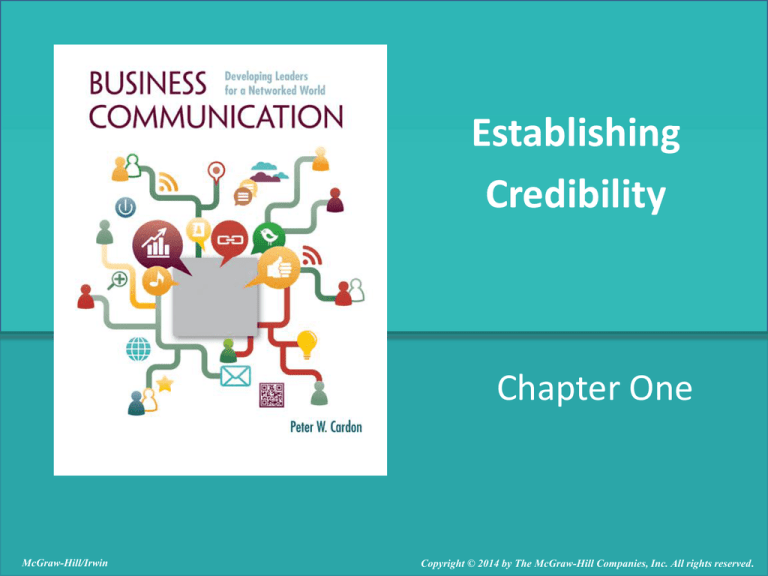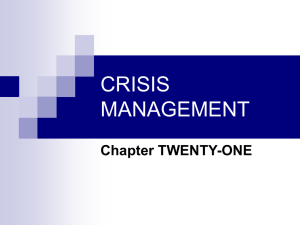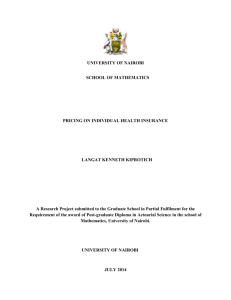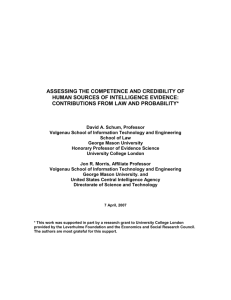
Establishing
Credibility
Chapter One
McGraw-Hill/Irwin
Copyright © 2014 by The McGraw-Hill Companies, Inc. All rights reserved.
Learning Objectives
LO1.1 Explain the importance of establishing credibility
for business communications.
LO1.2 Describe how competence, caring, and character
affect your credibility as a communicator.
LO1.3 Define and explain business ethics, corporate
values, and personal values.
LO1.4 Explain the FAIR approach to ethical business
communications.
1-2
Why Does This Matter?
Credibility
your reputation for being trustworthy
the degree to which others believe or trust in you
1-3
Establishing Credibility
Task 1 Establish
credibility through
competence
Task 2 Establish
credibility through
caring.
Task 3 Establish
credibility through
character.
1-4
The Role of Trust in the
Post-Trust Era
Operating from a position of trust or
credibility is one of the first things you should
consider as you communicate
Goal should be to gain trust or credibility
from colleagues, clients, customers, and
other contacts
1-5
The Role of Trust in the
Post-Trust Era
The public increasingly views companies with
less trust
A deficit of trust also exists within companies
Surveys show that employees often do not
trust their own business leaders
1-6
How Will You Overcome Public
Perceptions to Build Credibility?
Figure 1.1
1-7
The Role of Trust in the
Post-Trust Era
Post-trust era
the public overwhelmingly views businesses as
operating against the public’s best interests, and
the majority of employees view their leaders and
colleagues skeptically
1-8
The Role of Competence in
Establishing Credibility
Competence
refers to the knowledge and skills needed to
accomplish business tasks, approach business
problems, and get a job done.
Most people will judge your competence based
on your track record of success and achievement
1-9
The Role of Competence in
Establishing Credibility
People develop competence through study,
observation, and practice and real-world
business experiences
How you communicate directly affects the
perceptions others have of your competence
1-10
The Role of Caring in
Establishing Credibility
Caring
implies understanding the interests of others,
cultivating a sense of community, and
demonstrating accountability
Once an individual is perceived as unconcerned
about the interests of others or disinterested in
causes above and beyond himself, others
distrust such a person
1-11
Understanding the
Interests of Others
Your ability to gain credibility strongly
depends on your ability to show that you care
for the needs of others
Effective communicators gain trust by
connecting with others—that is, seeking to
understand others’ needs, wants, opinions,
feelings, and aspirations.
1-12
Cultivating a Sense of Community
The most effective business leaders in today’s
corporate environment have generally risen
to their positions because of their sense of
community and teamwork
Speaking about “our needs” or “your needs”
as opposed to “my needs” engenders trust
and helps you come up with solutions that
achieve mutual benefit
1-13
Demonstrating Accountability
A sense of accountability involves a feeling of
responsibility to stakeholders and a duty to
other employees and customers
By placing a rationale for accountability in
your communications, you will generate
substantial trust and goodwill from others
1-14
The Role of Character in
Establishing Credibility
Character
refers to a reputation
for staying true to
commitments made
to stakeholders and
adhering to high
moral and ethical
values.
1-15
What Determines Trust in
Individuals in the Workplace?
Figure 1.2
1-16
Business Ethics
Business ethics
the commonly accepted beliefs and principles in
the business community for acceptable behavior
Transparency
involves sharing all relevant information with
stakeholders
1-17
Business Ethics
Trust-building behaviors include:
extending trust
sharing information
telling it straight,
providing opportunities
admitting mistakes
setting a good example by following rules.
1-18
Business Ethics
Often employees fail to speak up when they
observe potentially unethical behavior.
Business professionals remain silent for four
basic reasons:
1. They assume it’s standard practice
2. They rationalize that it’s not a big deal
3. They say to themselves it’s not their
responsibility
4. They want to be loyal
1-19
Corporate and Personal Values
Corporate values
the stated and lived values of a company
Personal values
those values that individuals prioritize and
adhere to
1-20
eBay’s Code of Business
Conduct
Figure 1.3
1-21
Open and Honest Communication
1. By avoiding open and honest communication
2.
3.
of business problems, employees doom a
business to poor financial performance
Dishonesty is among the primary reasons for
lower employee morale
Dishonesty can be reason for dismissal
1-22
Fairness in Business
Communications
The FAIR test helps you examine:
how well you have provided the facts
how well you have granted access to your
motives, reasoning, and information
how well you have examined impacts on
stakeholders
how well you have shown respect.
1-23
The FAIR Test of Ethical
Business Communication
Figure 1.4
1-24
High-Trust Relationships, Ease of
Communication, and Improved Work Outcomes
Establishing credibility allows you to
communicate more easily and more
influentially
Credibility leads to less resistance from
others, increased willingness to cooperate,
and less likelihood of miscommunication
1-25
Consequences of Breaches in Trust
Figure 1.5
1-26
Overview of Book
Figure 1.6
1-27






![Crisis Communication[1] - NorthSky Nonprofit Network](http://s2.studylib.net/store/data/005428035_1-f9c5506cadfb4c60d93c8edcbd9d55bf-300x300.png)





